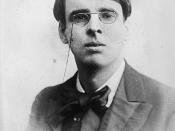William Butler Yeats wrote another masterpiece in "Sailing to Byzantium". This poem contains multiple meanings and emotions, and the poet uses various literary devices to communicate them. Two of the most dominant themes of this poem are the desire for escape from the hardships of this world and the quest for immortality.
The abrupt opening of this poem directly sets the tone for the entire volume. In Sailing to Byzantium, Yeats contemplates the cruelty of time, history and old age. The first stanza deals with the young and states that they too will die(This is also recurs quite strongly in Among School Children). Verses four and five all show symbols of life and of strength(e.g the salmon) just to make the dissapointement in verse six even bigger. Yeats's strong and rash statement is that everything dies, no matter how strong in life. The irony of fate is that man, when young, does not really think about culture but about nature.
Old men no longer live in this sensuous world, so they start writing passionate poetry when their body is no longer capable of sustaining a passionate mind. Being a passionate old man Yeats shows the cruelty of time and man's incapability to change it in the slightest way. One can neither change one's age nor the bodily decay.
The third stanza is what really makes this poem intriguing to the reader, when considering Yeats' view on history; O sages standing in God's holy fire As in the gold mosaic of a wall, Come from the holy fire, perne in a gyre And be the singing-masters of my soul (â¦) The repetition of "holy fire" and the obvious rhyme stresses the words "fire" and "gyre" and signals they must be in some way connected. "Holy fire" probably refers...


